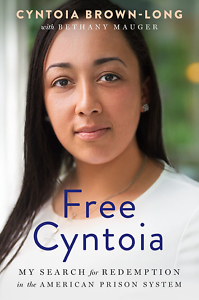Redemption Story
Free Cyntoia recounts a journey from victim to activist
In her memoir Free Cyntoia: My Search for Redemption in the American Prison System, Cyntoia Brown-Long recalls sleeping like a baby her last night in prison: “Instead of anxiety, I felt peace. A peace the ladies around me couldn’t understand. A peace so deep I slept like a baby my last night in prison, when everyone told me I wouldn’t be able to even close my eyes.”
 That sense of peace is an unlikely ending to a brutal and shocking story. Written with journalist Bethany Mauger, Free Cyntoia is a devastating look at the juvenile justice system from the perspective of the 31-year-old woman, imprisoned as a teenager, whose case captured the attention of celebrities like Rihanna and Kim Kardashian West and ultimately led to full clemency granted by Governor Bill Haslam in January 2019.
That sense of peace is an unlikely ending to a brutal and shocking story. Written with journalist Bethany Mauger, Free Cyntoia is a devastating look at the juvenile justice system from the perspective of the 31-year-old woman, imprisoned as a teenager, whose case captured the attention of celebrities like Rihanna and Kim Kardashian West and ultimately led to full clemency granted by Governor Bill Haslam in January 2019.
Brown-Long was placed into adoption as a child, ran away from home at 15, and lived with her boyfriend, a pimp and drug dealer nicknamed “Kutthroat” who raped and forced her into prostitution. At age 16, she was tried as an adult and sentenced to a minimum of 51 years in prison for the 2004 murder of a much older Nashville man who’d picked her up for sex.
Brown-Long devotes two sentences in Free Cyntoia to the crime that landed her in prison. Instead, the book is devoted primarily to the stories we haven’t heard: her closeness with her adoptive mother, her inability to fit in as a child, her transformation in prison, how religion and a relationship with the man she later married helped her find strength, and her calling to help other young victims of trafficking who, like her, may not even realize they are victims.
It wasn’t until she had spent more than a decade behind bars that Brown-Long first heard the word “trafficking” in relation to her case. She was attending a resource fair for women in the prison education program (she earned her associate degree in 2015 and later a bachelor’s degree from Lipscomb University), when a woman representing Magdalene House in Nashville walked up to her and told her about the petition she had signed to give Brown a second chance because of her age and the long sentence she received. “I work with girls like you every day,” the woman said. “There is no such thing as a teenaged prostitute. You were too young to consent to something like that. That’s trafficking.”
 For Brown-Long, this was a revelation that forced her to reevaluate everything she thought she believed about herself. The unhealthy behaviors she picked up from the people she hung around, the sexual abuse at the hands of her boyfriend, and her own lies and manipulations committed as a young girl trying to survive on the streets all came flooding back to her, revealed in a new light. She realized that other girls’ futures were at stake: “I felt a righteous anger for the girls still out there, the girls no one pays attention to. Everybody needs to know about this, I thought… I flew into activist mode.”
For Brown-Long, this was a revelation that forced her to reevaluate everything she thought she believed about herself. The unhealthy behaviors she picked up from the people she hung around, the sexual abuse at the hands of her boyfriend, and her own lies and manipulations committed as a young girl trying to survive on the streets all came flooding back to her, revealed in a new light. She realized that other girls’ futures were at stake: “I felt a righteous anger for the girls still out there, the girls no one pays attention to. Everybody needs to know about this, I thought… I flew into activist mode.”
Her new awareness was the catalyst for her to start the GLITTER project — the Grassroots Learning Initiative on Teen Trafficking, Exploitation, and Rape. She writes about how the energy and drive to help others while still in prison was an important part of her rehabilitation: “I saw my project shining a light on trafficking and preventing other girls from falling into the same mess I did. This didn’t need to wait until I got out of prison.” It was a TV interview with a local news anchor in Nashville to talk about the project that sparked the viral #FreeCyntoiaBrown campaign on social media.
Through it all, Brown-Long continued her work to reform the juvenile justice system and educate herself about the ways she could get people on the outside talking about trafficking. The fact that her exposure through social media also coincided with the #MeToo movement was “a gift from God,” according to Brown-Long. Despite the media attention to her case, she continued to focus on the other girls out there who, like her, were acting out of ignorance and a childlike need for acceptance. “Trafficking doesn’t have to involve a big underground operation with mobsters and girls being gagged and bound and thrown into car trunks,” Brown-Long notes. “Trafficking can be just one guy tricking one girl into selling her body.”
Free Cyntoia is a story of redemption, a story of faith that ultimately had a happy ending. But Cyntoia Brown-Long knows better than anyone that she was fortunate to receive a second chance. She plans to spend the rest of her life working for those who may not be so lucky. “There is hope,” she writes. “Hope for everyone locked in prisons physical or spiritual. No matter how far you may have fallen, that hope is still there for all who dare to believe their best days are not behind them.”

Joy Ramirez is a writer living in East Nashville. She is working on a novel.


